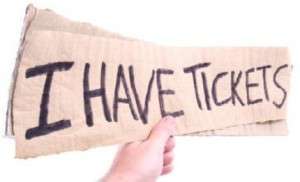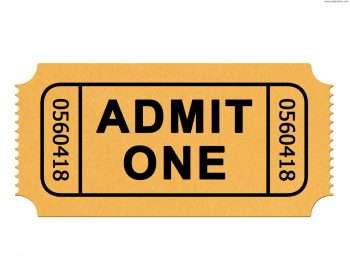WPT Fallsview Marred by Rampant Ticket Scalping
Anyone who has attended sporting events and concerts is familiar with scalping tickets. The practice of re-selling tickets for more than face value has been around forever and will continue to be around until all ticket sales are done electronically and systems are put into place to make selling above face impossible. It has a bad connotation (probably justified), but it’s not always that big of a deal. I have benefited from the ability to buy scalped tickets; there have been times I was willing to pay a bit of a premium to go to a game that was sold out. The big problem with scalping tickets occurs when people who have no intention of attending the event manipulate the system to make a profit by taking advantage of those who don’t have the ability to buy tickets early.*
Case in point: the unusual case of the World Poker Tour (WPT) Fallsview Poker Classic in Niagara Falls, Canada. It is a fairly short tournament series, consisting of just three events – a $1,100 event, a $2,500 event, and the $5,000 Main Event – over the course of ten days. The $1,100 event kicked off this past Saturday with the first of two starting flights. As one would expect to see in most live events nowadays, players could buy in directly or win a seat via a satellite. In either case, those who register for the tournament were given an entry card which served as their ticket for the event.
Pretty standard so far. But the tournament organizers at Fallsview figured out a brilliant way to create a shitstorm over a simple preliminary event. First, both starting flights were capped at 500 players each. I suspect the limit had something to do with physical capacity issues at the casino, but I do not know for sure. Second, entry cards were completely transferable. That is, once you had one, you could give it away, sell it, use it to start a barter economy, whatever. It was essentially a piece of property. And third, alternates were only allowed for the Main Event, not the $1,100 tourney. Alternates are people who register for an event but are not seated when the competition starts. Instead, they are given a number and once that number comes up (think deli counter), they are allowed to enter when a player is eliminated.
Those three factors combined to create the problem of ticket scalping, particularly prior to Day 1B, since that was the last chance for people to enter the tournament. The 500-player cap artificially created a supply problem, as did the absence of alternates. Add in the fact that players could sell their entry cards and you had a total mess.
DJ MacKinnon was quoted on PokerNews.com as saying, “The tournament area is next to the food court and Fallsview permits the scalpers to hound people coming off the escalator to ask if anyone wants to buy or sell tickets. The morning of (Day 1b) the cafeteria was crowded with a bunch of people near the tournament area trying to sell tickets. I know of two tickets that sold for $1,800 and $1,600 respectively.”

Image credit: http://www.osmguy.com
It is not unusual for tickets to be transferrable. It is very common for players to win a seat via satellite and then sell it, guaranteeing themselves a profit. The difference in the typical scenario is that most tournaments don’t put a cap on entries and therefore there isn’t a reason for anyone to pay a premium for a ticket, as they can buy them at face from the cashier. Satellite winners who sell their seats are more than happy to sell at a slight discount, say, $1,000 or $1,050 for a $1,100 ticket because they still lock in a profit. The buyers benefit from a lower price.
But the limit on the number of seats available meant that once tickets were sold out, there was no way for someone who showed up at the last minute (or hours) to play unless they paid more than $1,100. There were many non-poker players who predicted this would happen, so they either bought tickets from the cashier or purchased them from early satellite winners with the sole reason to sell them above face. They had no intention of playing.
Scott Davies, who had just made a couple final tables at the Aussie Millions, was one of those last-minute hopefuls, as he had just flown in from Australia. Posting under the screen name “miamicane,” he expressed his disgust on Two Plus Two:
Pretty awful day at Fallsview today. I didn’t get a ticket in advance bc I just flew in from Australia late last night. Showed up day of event and tix were sold out. Went down to the tournament area to see if I could buy one off someone and the going rate was $1.5-$1.6k for an $1100 seat. First guy that approached me said “how high are you willing to go?” I said $1.2k and he laughed at me. So gross.
Pretty awful that the casino creates perfect conditions for the scalpers. They cap the number of entries, let people buy multiple fully-transferable tickets, and then don’t take any alternates the day of the event. So it essentially cuts off the supply at the same moment demand peaks creating a black market. It literally brings out all of the bottom of the barrel scum of the earth to the poker area. These guys show up the day of the event with heaps of tickets and no intention of ever playing the event. I can’t believe the casino allows these guys to do business in their casino, they are as obvious as ticket scalpers at a sporting event/concert, and just as sleazy.
He also relayed the story of another man who took off of work, drove five hours to Fallsview, and paid for a hotel only to find out he was either going to have to pay $1,500 for a $1,100 tournament or sit out.
To make matters worse, this is not the first time this has happened at WPT Fallsview, as it consistently sells out. You would think the casino would learn its lesson, but it apparently hasn’t.
It is not a difficult fix, either. Obviously one solution is to not have a registrant cap, but there might just be space issues, so maybe that’s not feasible. Allowing alternates, as is done for the Main Event, is one easy step, as even though alternates would be at a disadvantage entering the tournament late, most people would probably be more willing to do that than pay above face value. There still might be some scalping, but the demand would go way down, so the premiums paid by the few who still bought scalped tickets would likely be more palatable.
Another option, and I must admit I don’t know if the casino’s systems can be setup to do this, would be if Fallsview could had tournament tickets stored on a player’s rewards card rather than giving out physical vouchers. Then, if players wanted to transfer or sell their entries, they would do so at the cashier with both parties present and the sale price could not be more than face value. Again, I don’t know if this is possible, but it seems like something that could be done in this, the year 2015.
* Which, now that I think about it, is most of the time, so yeah, screw scalpers.



















COMMENTS